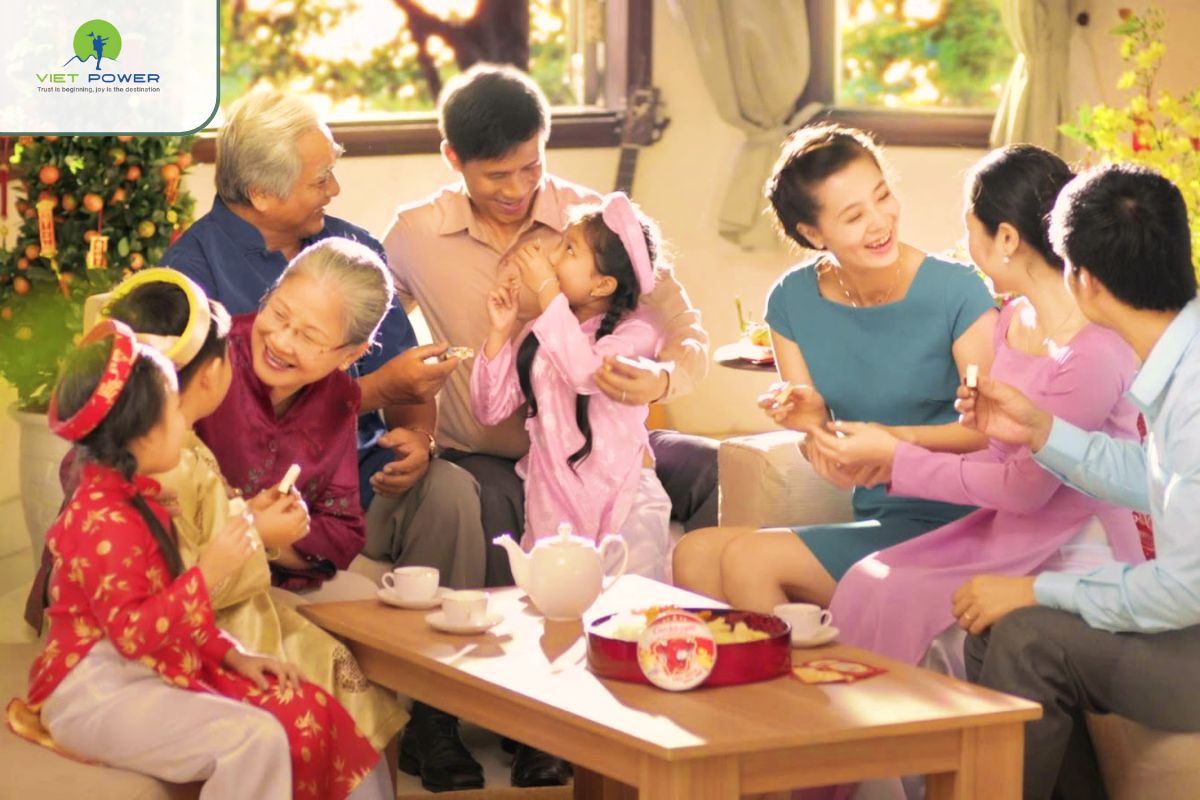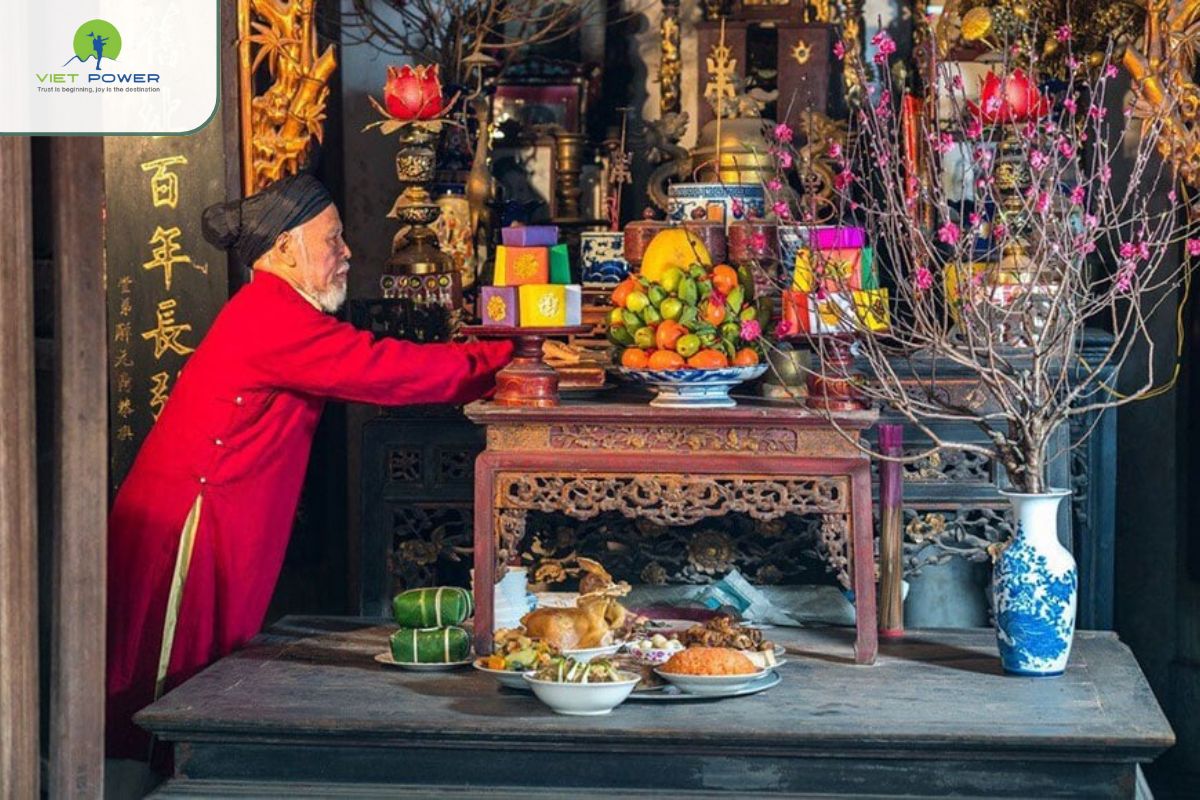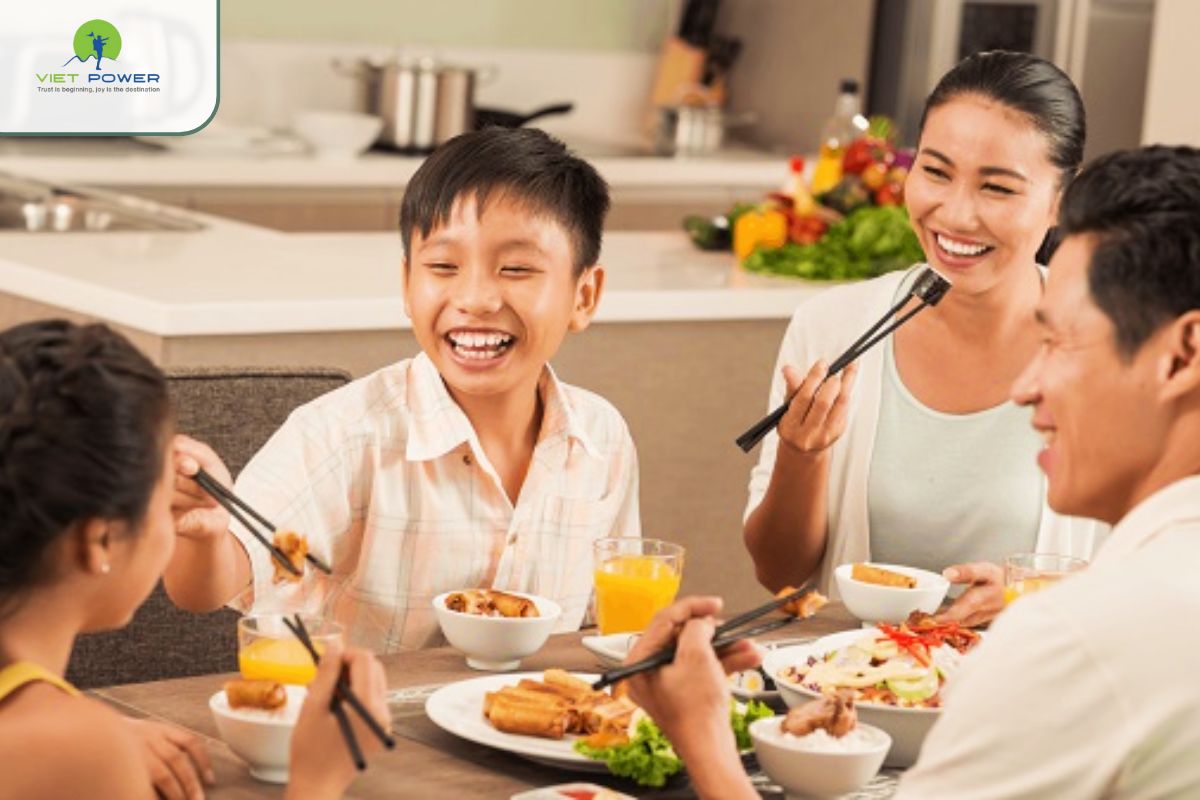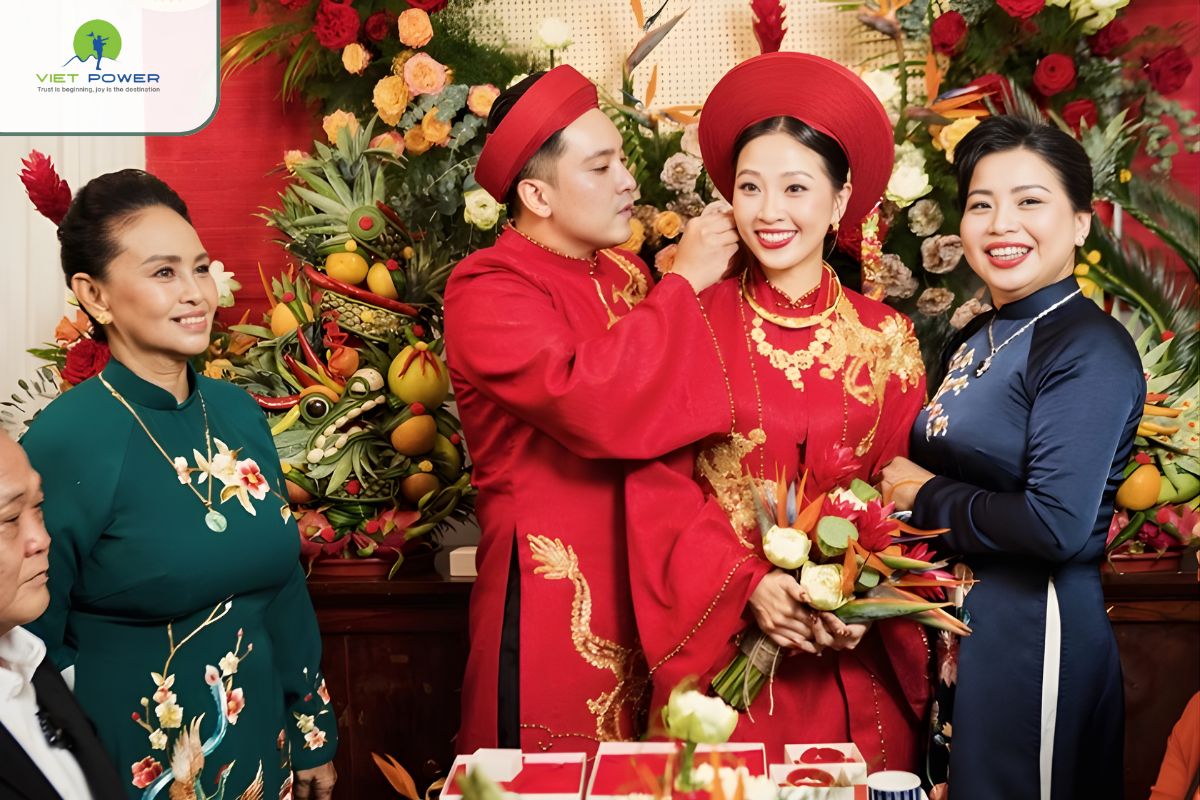Vietnam is not only famous for its stunning landscapes and vibrant street food. Its soul lies deeper, in the warmth of its families and the timeless traditions that connect generations. At the heart of Vietnamese culture stands one powerful force: family. From daily meals to ancestral worship, every gesture reflects respect, gratitude, and unity.
If you want to go beyond sightseeing and truly understand what shapes the Vietnamese way of life, join Vietpower Travel on a cultural journey to experience Vietnamese family traditions firsthand, from the family meal to the ancestral altar.
In Vietnam, family means everything. It’s not just a social unit but the foundation of identity, morality, and emotional strength.
Unlike many Western societies where life revolves around the individual, Vietnamese life centers around the family. Success belongs to everyone, and hardship is shared collectively.
You’ll see this everywhere, in the smiles of street vendors supporting their children’s education, or in the laughter echoing from multi-generational homes.
When you travel with Vietpower Travel, you can visit traditional villages in Hoi An, Hue, or the Mekong Delta, where extended families still live under one roof. Watch how grandparents, parents, and children share tasks and care for one another. It’s a living lesson in Vietnamese family values.

Family symbolizes unity, respect, and continuity. Every individual is seen as part of a larger whole, connected by love, duty, and gratitude across generations.
Related Experience: Discover the warmth of Vietnamese hospitality during our Hoi An Tour, where you can share tea with a local family and learn their daily routines.
Discover the beauty of Vietnamese culture: traditions, family values, festivals, cuisine, clothing, and faith that together form the timeless soul of Vietnam.
One of the most meaningful Vietnamese family traditions is ancestor worship, a practice deeply woven into daily life. Every Vietnamese home, from countryside cottages to modern city apartments, has an altar to honor past generations.
On the family altar, you’ll often find photos, fruit, flowers, and incense. Lighting a stick of incense each morning is more than a ritual; it’s an expression of gratitude and remembrance. During special occasions like the death anniversary, families prepare the favorite dishes of the deceased, offer them on the altar, and then share the meal together, a heartfelt mix of remembrance and joy.

Ancestor worship in Vietnam is a private and family-oriented tradition, so travelers are usually not invited to join household rituals. However, during major festivals such as Tet (Lunar New Year) or celebrations honoring local deities, visitors may have the chance to observe related offerings and ceremonies at pagodas or temples. Vietpower Travel provides cultural guidance to help visitors appreciate these customs respectfully and authentically.
You can find more posts related to this topic in the category below:
If the altar represents spiritual connection, the family meal is the living heart of every home. A Vietnamese family meal is about more than food, it’s about belonging.
Meals are communal, with dishes placed in the center: a bowl of rice, a soup, a main dish, and seasonal vegetables. Family members share food, laughter, and conversation. No one starts eating until the eldest takes the first bite, a subtle gesture of respect.
Through Vietpower Travel’s Culinary Experience in Ho Chi Minh City, you can join a local family for dinner. Learn to cook traditional dishes like sour soup or Caramelized fish, and experience firsthand how mealtime becomes a lesson in love, patience, and respect.

Highlights of the Vietnamese family meal:
Even in busy cities, this tradition remains strong. Many young professionals return home every Sunday for dinner. For them, the meal keeps family ties alive despite the modern pace of life.
What dishes are typically served in a Vietnamese family meal?
Typical meals include rice, stir-fried vegetables, soup, and a main dish such as pork, fish, or tofu, all prepared to balance flavors and nutrition.
Among all Vietnamese family traditions, Tet - Lunar New Year stands out as the most important. It marks renewal, reunion, and respect. In the days before Tet, families clean their homes, decorate with red and gold, and prepare Chung cake (square sticky rice cake).
During the celebration, family members gather, light incense to invite ancestors home, and share blessings for the new year. Streets glow with lanterns, and homes overflow with laughter.
Traveling with Vietpower Travel during Tet offers a rare opportunity to witness or even join these family rituals. You can learn to make Chung cake, visit flower markets, and experience the spirit of reunion that defines Vietnam.
Tet usually falls between late January and mid-February, depending on the lunar calendar. Vietpower Travel offers special tours that let travelers experience the festive atmosphere authentically.
Continue exploring similar posts to learn more about Vietnam’s traditions, heritage, and way of life;
Vietnamese weddings beautifully reflect Vietnamese family values. They are not only the union of two people but of two families. Ceremonies include offerings, blessings, and symbolic acts of respect for elders and ancestors.
Travelers visiting Vietnam may have the chance to witness a traditional engagement or wedding ceremony, especially in rural areas. Each ritual, from gift exchange to tea serving, embodies harmony and gratitude.
Sometimes, yes — and often in the most unexpected ways. Many travelers have shared videos on TikTok showing how they were warmly invited to join a local wedding in the Mekong Delta or stumbled upon a couple taking wedding photos while rowing boats in Trang An, Ninh Binh. Such spontaneous encounters are common in Vietnam, where hospitality runs deep and guests, even strangers, are welcomed with open arms.
While these moments happen naturally, Vietpower Travel can help travelers understand the cultural meaning behind these joyful celebrations — from the tea ceremony to the family blessings — ensuring every interaction is respectful and enriching.
Even far from home, Vietnamese families continue to honor their heritage. In the United States, France, or Japan, family altars still stand proudly in living rooms. Children learn Vietnamese language, join Tet celebrations, and practice respect for ancestors. For travelers visiting Vietnamese communities abroad, these traditions reveal how culture transcends geography. Love, respect, and remembrance remain the unbroken threads that connect generations.
They maintain small rituals, lighting incense, preparing favorite dishes, and gathering for special holidays like Tet, to preserve their roots.
Related Experience: Learn more through our Touching the Essence of Vietnam's Historical Sites tour, exploring how Vietnamese traditions evolve yet remain timeless.
Modern life in Vietnam is changing fast. Cities are growing, technology is everywhere, and many young people move away for work or study. Yet Vietnamese family traditions still thrive. The bond between parents and children stays strong, forming the heart of Vietnamese culture. Even when families live apart, they stay connected through calls, video chats, and weekend visits. Each reunion becomes a small celebration of love and belonging.
In the past, men were usually the breadwinners, and women cared for the household. But as society has evolved, so have these roles. Modern families now share responsibilities more equally. Both men and women contribute to earning a living, raising children, and caring for elders. This balance shows how Vietnamese family values — love, respect, and gratitude — continue to guide daily life even as lifestyles change.
You will often see simple but touching scenes: a father cooking dinner while the mother helps the children with homework, or young adults visiting their grandparents after work. These moments reveal how tradition and modern life blend naturally in Vietnam.

Even with smartphones and busy schedules, many young Vietnamese still follow traditional customs. They bow to their elders during Lunar New Year, bring gifts when visiting relatives, and gather for the Vietnamese family meal on Sundays. These habits remind them of who they are and where they come from.
When you travel with Vietpower Travel, you can experience this beautiful mix of old and new. During our cultural tours, travelers can visit modern Vietnamese families in Hanoi or Hue. You can share tea with them, listen to their stories, and see how they balance tradition with modern life. These experiences reveal the real heartbeat of Vietnam — one that is modern, yet deeply rooted in family love and respect.
Yes, it is absolutely possible. Through guided visits and homestay experiences, travelers can observe how families live, work, and care for one another. You will see how technology, education, and new opportunities have changed routines — but not the values. Respect for elders, devotion to family, and gratitude for one’s roots still shape everyday life.
Vietnam’s strength doesn’t lie only in its landscapes or cuisine. It lives in its people, and in the families that shape them. Each shared meal, each bow before the altar, and each heartfelt story carries the spirit of Vietnamese culture: love your roots, honor your elders, and cherish one another. You can do more than observe; you can experience. From family dinners in Hanoi to ancestral ceremonies in Hue, every tour offers an authentic connection to Vietnam’s living heritage
